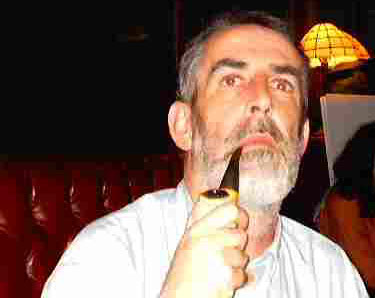|
|
|
alt-usage-english.org |
| Home |
| Newsgroup |
| Intro Documents A B C D E F G |
| FAQ |
| FAQ Supplement |
| ASCII IPA |
| Audio Archive |
| Links |
| UCLE Corner |
| What's New? |
| Search |
| Site Map Where am I? |
| Contact |
|
|
Padraig Breathnach |
|
A page from the AUE photo gallery. 
People have shown interest in the origin and pronunciation of the name "Padraig Breathnach". Padraig writes: "Padraig"First, a minor point with which I do not burden people in AUE: the proper Gaelic spelling is "Pádraig"; an equally-common version is "Pádraic". "Padraig" comes from the Latin "Patricius". St Patrick was from Wales, and was a member of a Roman or a Romanised family. More likely Romanised, as his Latin was, apparently, not very good. [There is a story that his mother came from France, from Touraine, and that Patrick was related to St. Martin of Tours.] The Irish Celtic people had difficulty with the name because of the phonic system they had available to them. One early Irish version was "Coithric" (pronounced something like "CUH-rick"). The initial "C" came in because "P" was not generally used in Gaelic. Other early versions have the "P". The "t" in "Patricius" was effectively cancelled. In Gaelic, where either "d" or "t" is followed by "r" it often elided. Over time, more Gaelic people acquired the "P" sound, and the "Coithric" version dropped out of use. In some Gaelic dialects there appears to have been an incorrect reversal if the elision of the "t". It was restored as a "d". That is reflected in modern spelling, and in the pronunciation of "Pádraig" in some dialects today. My preferred pronunciation is something like "PAW-rick"; others have suggested "PORR-ic", and I would not argue too strongly with them. It's somewhere in there. There are other pronunciations which are also correct if one speaks a different dialect of Gaelic. "Breathnach"There are two major groups of Celtic peoples in this part of the world: The Goidels and the Brythons. These terms are favoured by scholars. In popular usage, one finds the versions "Gael" and "Briton". The Goidelic people are the Irish, the Scots, and the Manx. They are also classed as the Q-Celts because they used a "q" or hard "c" sound in certain words (e.g. "ceann" for "head"). The Brythonic people include the Welsh, the Cornish, and the Bretons. They are classed as P-Celts because they used the "p" sound where the Goidels used the "q" sound ("pen" for "head"). In Gaelic, the word "Breathnach" means "Brythonic". This is not the same as "British" in the modern sense. It is narrower in application, referring to Celtic people. Because the Irish have had far more interaction with the Welsh than with the other Brythonic peoples, it is often used simply to mean "Welsh". In fact, that is the common anglicisation of the name: Walsh or Welsh. I find it difficult to give anything other than a crude guide to pronunciation. One might say "BRANN-och" and not be too far off. But it is not quite right.
Listen: [MP3] [WAV] Other names are pronounced in the Audio Gallery. |
|